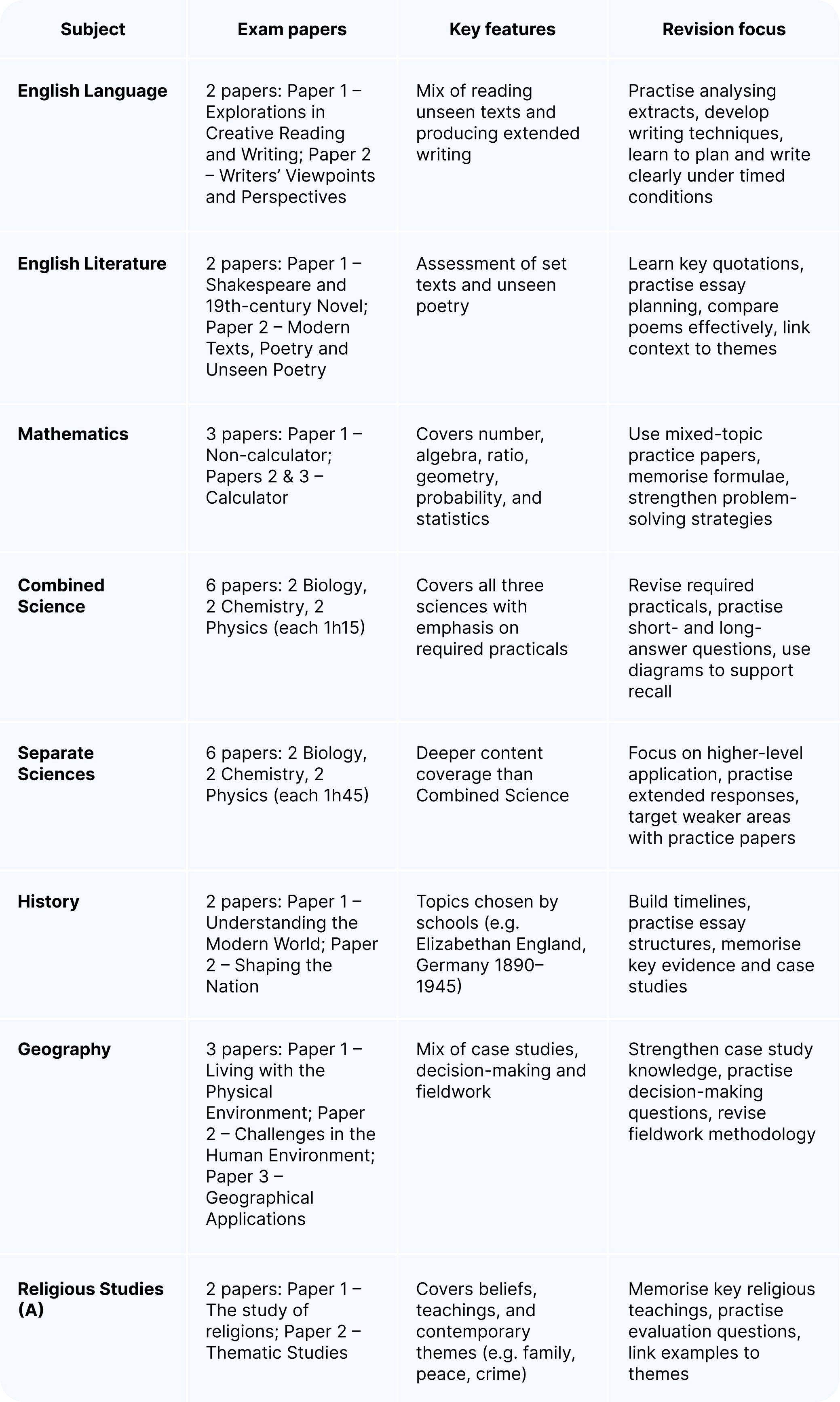Contents
Preparing for AQA GCSE exams can feel overwhelming, but revision can become structured and manageable with the right strategies. This guide explores practical approaches, subject-specific tips, and exam techniques to help students feel confident and supported throughout their exam preparation.
What this post covers:
Why AQA GCSE exam preparation matters
Key features of AQA GCSE assessments
Subject-by-subject exam structure and revision focus
General revision strategies
Subject-specific revision tips
Effective exam technique
Final advice for parents and students
Why AQA GCSE exam preparation matters
AQA is one of the largest exam boards in the UK, with GCSE qualifications taken by hundreds of thousands of students each year. Their exams test knowledge, understanding, and the ability to apply learning in real-life contexts.
AQA GCSEs often include multiple exam papers per subject, with multiple question styles, from short-answer recall to extended essays. This means preparation is about more than memorising facts; students also need to practise how to use knowledge clearly, stay calm under timed conditions, and feel confident tackling different types of questions.
Good preparation helps students achieve higher grades and builds the study habits and resilience they’ll need for A Levels, apprenticeships, or future careers.
Key features of AQA GCSE exams
Multiple exam papers: Most subjects are split into two or three written papers.
Assessment objectives (AOs): Questions often assess recall, analysis, evaluation, and application of knowledge.
Practical elements: Some subjects, such as Sciences, Geography, and Art, include assessed coursework or practical skills.
Variety of question types: AQA often uses short-answer, structured, and extended response questions, requiring a mix of knowledge recall and developed writing.
Subject-by-subject exam structure and revision focus
Each AQA subject has its own exam format, and understanding the structure can make revision more focused and manageable.
The table below outlines the main features of core subjects and highlights the areas where students should prioritise their efforts.

General revision strategies
A strong revision plan balances content knowledge with skills practice.
Here are some evidence-based approaches that make a real difference for AQA GCSE exams:
1. Break down the specification
Each AQA subject has a published specification listing all topics. Turning this into a checklist ensures nothing is missed and helps students track progress as they revise.
2. Use practice papers effectively
Working through AQA practice papers under timed conditions builds confidence with exam structure. Checking answers against official mark schemes shows exactly how examiners award marks and highlights areas to improve.
3. Mix active recall with spaced practice
Tools like flashcards, quizzes, and mind maps make revision more interactive. Revisiting topics at regular intervals strengthens memory far more effectively than re-reading notes.
4. Apply knowledge to exam-style questions
AQA exams often ask students to use knowledge in new contexts. Practising exam-style questions helps build the skill of applying learning rather than just recalling facts.
5. Balance revision sessions
Short bursts of focused study (25–30 minutes) followed by a 5–10 minute break are more productive than hours of cramming. This keeps concentration high and reduces stress.
6. Review regularly, don’t cram
Revisiting topics little and often throughout the year prevents last-minute panic. Even 20 minutes a day in the early months can build a strong foundation for exam season.
7. Look after wellbeing
Sleep, exercise, and good nutrition are part of effective revision. Breaks and relaxation are just as important as study time, keeping students healthy and motivated.
Subject-specific AQA revision tips
English
Practise annotating unseen extracts quickly.
Use flashcards for key quotations in Literature.
Develop essay answers using the PEEL (Point, Evidence, Explanation, Link) technique.
Mathematics
Practise problem-solving through mixed-topic papers.
Memorise key formulae and practise applying them.
Redo difficult questions until the method feels secure.
Sciences (Biology, Chemistry, Physics)
Learn the required practicals thoroughly.
Use diagrams to support memory of key processes.
Practise writing clear and structured extended responses.
Humanities (History, Geography, Religious Studies)
Create timelines or summary sheets for case studies.
Practise essay writing under timed conditions.
Test recall with practice questions on key events and examples.
Arts and practical subjects
Organise coursework early to leave time for improvements.
Rehearse practical elements such as performances or artworks.
Keep a reflective log to track progress and feedback.
Effective exam technique
Read questions carefully: Command words like “evaluate” or “compare” signal what the examiner expects. Taking a few seconds to highlight these reduces the chance of missing marks.
Plan extended answers: A quick outline before writing essays or long responses keeps ideas organised and ensures the whole question is addressed. This saves time and makes arguments clearer.
Keep to time: A good rule is one minute per mark. If stuck, move on and come back later. Pacing helps students feel in control throughout the paper.
Check answers: Reviewing work at the end can earn easy marks, whether by spotting a missed calculation step, correcting a spelling mistake, or adding an extra detail to support an answer.
Final advice for parents and students
Preparing for AQA GCSE exams is a shared journey between students and their families.
Parents can play a key role by helping to create a realistic revision timetable, setting up a quiet and well-equipped study space, and encouraging a balance between focused work and time to relax. Celebrating effort, not just results, is a powerful way to keep motivation high.
For students, the most effective approach is steady and consistent: practising exam-style questions, keeping on top of the full specification, and remembering that wellbeing matters just as much as study time. While feeling nervous is normal, every small preparation step builds confidence. With structure, balance, and support, students can face their exams ready to do their best.
Don’t miss Atom’s GCSE giveaway!

Six months. Six epic prizes. Six chances to make the GCSE season unforgettable.
We’re launching Atom for GCSE prep in 2026, and to celebrate, over the next six months, we’re giving away thousands of pounds worth of prizes to help your child level up their GCSE revision.
Here’s a taste of what’s up for grabs:
The latest Apple tech, including an iPad Air, Vision Pro and more
Festival tickets for Boardmasters and Reading 2026
Europe interrail passes and £1,000 spending money
…and that’s just a few of the amazing prizes available.
Our first two winners have already taken home incredible prizes! Find out who they are and what they won in our latest giveaway update and keep an eye out for news of our November winner.
It’s free to join. UK only. Full T&Cs apply.
Contents
